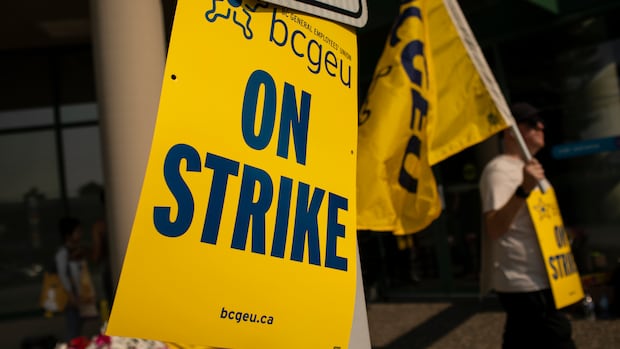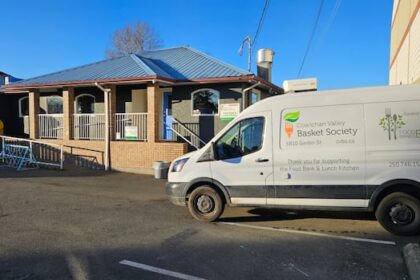Thousands of public service workers are in their seventh week of strike action as their union and their employer — the province — have come to an impasse over negotiating new terms, specifically higher wages, for their contracts. As of Friday, Oct. 10, the B.C. General Employee’s Union (BCGEU) said more than 25,000 workers are on strike at over 470 worksites across the province.What does this strike mean for British Columbians? The BCGEUFirst off, the BCGEU is a union that represents 95,000 members total. About one-third of its membership works in direct government service, in roles like social work, natural resource management, correctional facilities, wildfire management and income assistance, among others. About 34,000 members are part of the bargaining unit that is currently involved in job action. This includes people working in several government ministries, government-run liquor and cannabis stores, the B.C. Pension Corporation and more. Picket linesYou may have come across people carrying big yellow signs, walking in front of buildings where government offices are. Those are striking BCGEU workers. The union has established picket lines at more than 100 sites across the province, including government-run liquor and cannabis stores and some ministry offices. Picket lines are boundaries established by striking workers, which people are asked not to cross as a show of solidarity. Residents are not legally bound by picket lines. The BCGEU says most union workers in B.C. have the right to not cross a picket line without facing repercussions at work. Union president Paul Finch said British Columbians have been generally supportive of workers out on picket lines, but they have seen a few instances of aggression and violence toward striking members. BCGEU employees form a picket line in Vancouver on Sept. 4, 2025. (Ben Nelms/CBC)Essential staffing levelsUnder B.C.’s Labour Relations Code, leaving some jobs and worksites vacant during strike action poses a risk to British Columbians’ health and safety. In the event of a strike, mediators help determine which jobs are considered essential services so that those positions continue to be filled. In the case of this strike, jobs like social workers, income assistance workers, wildland firefighters, healthcare workers, and meat inspectors have all been deemed essential, and their services won’t suddenly stop. Government servicesSome government services are unavailable during the strike, including those accessed through Service B.C. and FrontCounterBC. More than 14,000 striking BCGEU members are administrative staff — which means a lot of office work is stalled. Service B.C. connects British Columbians with all sorts of things like driver’s licences and health care cards, business registration, tenancy disputes, marriage, hunting and fishing licences. And while job action continues, some offices will be closed. The Service B.C. website is updating which offices are open and closed depending on strike action. Many are only able to assist with matters relating to social work and income assistance during the strike. FrontCounterBC, on the other hand, handles natural resource-type issues. You can check whether your local office is open here. Student loan paymentsThe ministries of Education and Child Care and Post-Secondary Education and Future Skills are both affected by job action. StudentAid B.C.’s online application systems have been taken offline and payments delayed “until normal service resumes.”Students like William Kelly of Lake Country, B.C., have reported seeing a red box when they try to check the status of their student loans. Kelly said he has not yet received his fall student loan instalment, whereas he usually gets it about two weeks into the semester. Others like Liam Grace say they have received their loan payments, but worry about next semester as the strike drags on. The Ministry of Post-Secondary Education said it has processed funding requests for more than 46,000 students since August, and that most students who applied have received their funding.Liquor, cannabis storesPicket lines are set up in many places, but some of the key picketing locations are at government-run liquor and cannabis stores provincewide. BCGEU employees are pictured on strike outside of a government-run liquor store in Vancouver on Friday, Oct. 3, 2025. (Ben Nelms/CBC)BCLIQUOR’s website has compiled a list of stores that are closed as a result of job action.B.C. Cannabis Stores also keeps a running list of stores that are currently closed. Online ordering from both BCLIQUOR and B.C. Cannabis Stores has been suspended. And while private liquor stores remain open, they get their product from Liquor Distribution Branch warehouses — which are part of the strike. However, local producers like wineries and breweries remain open and can sell their products to the public. Alcohol in restaurantsIt could also become difficult to get a drink in some restaurants, according to the B.C. Restaurant and Food Services Association, as the B.C. Liquor Distribution Branch, where restaurants get their alcohol, is also involved in BCGEU job action with a ban on overtime at its warehouses.Association president Ian Tostenson said while some larger chains may be able to stock up to mitigate impacts of further strike escalation, he said some smaller eateries don’t have the funds or space to do the same. “It just sets into motion an uncertainty that we shouldn’t be having to deal with in an industry right now that’s been faced with major labour shortages in our kitchens and tariff uncertainties, economic uncertainties,” Tostenson told The Canadian Press. WATCH | Private liquor stores barred from selling to restaurants:B.C. should let restaurants, pubs buy liquor from private stores, alliance saysAs the BCGEU strike wears on, pubs and restaurants are finding themselves in a frustrating situation — while they’re nearly running out of stock, nearby liquor stores are legally barred from selling to them because they’re privately owned. Alliance of Beverage Licensees executive director Bo Chen said the restriction needs to change to give the hospitality industry a better chance of weathering out the strike.Royal B.C. MuseumTourists and locals in Victoria looking to check out the Royal B.C. Museum are likely to come across a picket line at the museum entrance, however, the museum’s website says the museum’s galleries remain open. The IMAX Theatre at the museum, along with the B.C. Archives, coffee bar and food trucks outside are closed due to the strike, the website says. It also appears several museum events have been cancelled or postponed. How long could all this last? Tough to say. The strike, now in its seventh week, is the BCGEU’s most significant in 40 years, according to Finch — and negotiations aren’t going well.“Civil servants do not strike easily,” Finch said. “We’d obviously much rather be at work, but unfortunately, government is still refusing to negotiate fairly, so that’s why we’re forced to escalate here. We hope that they’ll come back to the table and that will minimize the impact on British Columbians.”On Oct. 8, Finch said the union’s strike fund is “healthy,” indicating they can afford to persist.
Thousands of B.C. public workers are on strike. What does that mean for you?











